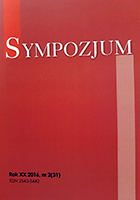Kapituła Generalna podmiotem najwyższej władzy w instytucie zakonnym
General Chapter as the instance of supreme authority in a religious institute
Author(s): Józef WroceńskiSubject(s): Christian Theology and Religion, Theology and Religion, Canon Law / Church Law
Published by: Wyższe Seminarium Misyjne Księży Sercanów
Keywords: general chapter; the highest authority; powers and tasks; religious institute; religious superiors; resolutions of the chapter
Summary/Abstract: In this paper, the author accentuates the fact that authority in religious institutes does not only have a purely institutional character, but it also includes spiritual and community elements. The exercise of this power within the whole institute and at all levels of governance of the institute is made in both individual and collective terms, under the general and their own institute’s laws. Referring to the constant tradition of the issue of governing institutes he notes that the management of the institute cannot in any event be entrusted to the whole community as such. The essential tasks of a board in institutions, whether in terms of individual or collective management, are the organisation of the structures of community life and the protection of fidelity to the mission of the institute and its charisma.In the later part of the study, the author also indicates that a general chapter should not to be perceived in a mythical way, i.e. as if it were a panacea for all religious ills. In the institute of consecrated life, the board’s perfection depends not so much on the structures, but on persons with adequate natural gifts and an individual charisma. Deficiencies of individual superiors involving the inappropriate governance will not be removed by the action of a collective body that is the general chapter. Also, one should not be under a delusion that in the acts of the general chapter responsibility is spread over many people and it decreases individual responsibility. Besides, it is wrong to seek and promote the spirit of a democracy that aims to defend the personal rights of individual members or groups in a religious institute. This may sometimes lead to applying for rights that should rather be part of powers opposite to the Gospel. The general chapter, therefore, should be a sign of unity in love of the institute and express a common concern of all its members for the good of the whole community.
Journal: Sympozjum
- Issue Year: 31/2016
- Issue No: 2
- Page Range: 211-237
- Page Count: 27
- Language: Polish

